A Treasure of Word Lists
The whimsy of synonyms and a children's book about Roget's Thesaurus
This week features a book about Peter Roget, his word lists, and his book
“The life of every man is a diary in which he means to write one story, and writes another; and his humblest hour is when he compares the volume as it is with what he vowed to make it.” – J.M. Barrie
I don’t even know at this point if it’s just my state of mind or if my responses to things have any footing in reality. I’m not sure if I’m melodramatic or flatlined. I no longer distinguish the borders of mood from something more pervasive. But I opened a children’s book this week and was overwhelmed by how much I loved it. I knew I was going to like it because I have talked about other books by this illustrator, but I loved this one maybe an inordinate amount.
A lot
A great deal
Excessive
Extreme
Disproportionate
Unreasonable
Outrageous
Hyperbolic
Preposterous
Unbelievable
UnfathomableThank you to those who didn’t skip over the little elevated No. 1 last week in the intro. Thank you to those who followed and found and read the letter, which was tucked away, a detour, an off-ramp, a brambled path. It was its own sort of wander, a message folded, a puzzle to solve. Those who had no interest in all of those extra words, the me-ness of it all, didn’t really have to see them. It was freeing.
Today’s post is about a specific children’s book, but it spirals and branches and twists and turns with its own bit of word play. By the end of the week, I had reserved and retrieved several other books by this illustrator, a delightful stack. Her illustration and aesthetic excites and inspires me.
Thank you to those who read, who stir the words, who push through the undergrowth, gathering crumbs. There is something in the trail, something in the mapping.
Amy
(For those who prefer to listen, I recorded part of this post as Episode 500.)
🎯 The Sunday post is free to all readers. Thank you to readers who have upgraded their subscriptions in support of Illustrated Life or made a donation. I hope you find inspiration and a gentle nudge week to week to document your unique creative life.
A Library Hold
I think Thesaurus Day was on the prompt calendar list for Week Three. (Yes, it was.) I know that I put something about synonyms in the prompt set. (Yes, I did.) I’m not sure how I went from there though to discovering this book.
I might have been just looking for something by Melissa Sweet or planning to take another look at some of her books. I’m a big fan of River of Words, about William Carlos Williams, and The Boy Who Drew Birds, about Audubon.
Somehow, everything connected, and I ended up with The Right Word: Roget and His Thesaurus, written by Jen Bryant and illustrated by Melissa Sweet, in a pile of books at the library waiting on hold for me.
I don’t have young kids at home anymore. Many of you “grew up” with me and the podcast and also may not have kids at home or at all. That doesn’t mean we can’t still enjoy children’s literature. Looking through and appreciating children’s book illustration is something we are never too old to do.
💥 Tip: Don’t worry about whether or not you have a reason to think about this children’s book. Sometimes we make discoveries and find inspiration and comfort in unexpected places.
I did not know the story behind Peter Roget and the book that became the thesaurus, the book that was a boy’s childhood project, the book that we all know, even if we know it like the word Kleenex, as Roget’s Thesaurus. After reading The Right Word, I’m not sure if I’ve ever seen a real copy of Roget’s Thesaurus, not simply a knock-off thesaurus.
🔮I have strong memories, vaporous but persistent, of being a very young poet and using a thesaurus, but I can’t picture that book and its lists.
I had never even thought about a thesaurus as a collection of lists. But of course it is.
It’s a book that seems to be out of fashion, gone by the wayside, and phased out. When was the last time you consulted a thesaurus? Looked up a synonym? Maybe you’ve considered synonyms but acquired them in a different way. After all, whatever dictionary we use (probably online) is quick to offer synonyms alongside definitions and pronunciation guides.
📒Oh… I had a sudden flash that maybe the young poet had a rhyming dictionary? How embarrassing that feels. Maybe I only had a rhyming dictionary, not a thesaurus? Was there even such a thing? Maybe I had both, one more embarrassing than the other, but both books I might have given the side-eye, cast off, hid away, looked askance at, or even rejected, shunned, or dismissed along the way.
Certainly rhyme went out the window.
Who would need a thesaurus?
And so it is surprising and unexpected and delightful, whimsical, joyful, and playful to have read this book and been so charmed by the story and the art and the discovery that there is such a strong connection between the history of Roget’s Thesaurus and lists.
🔎 Note: Roget didn’t invent the thesaurus. There is a history of this type of book that goes much farther back.
The Right Word
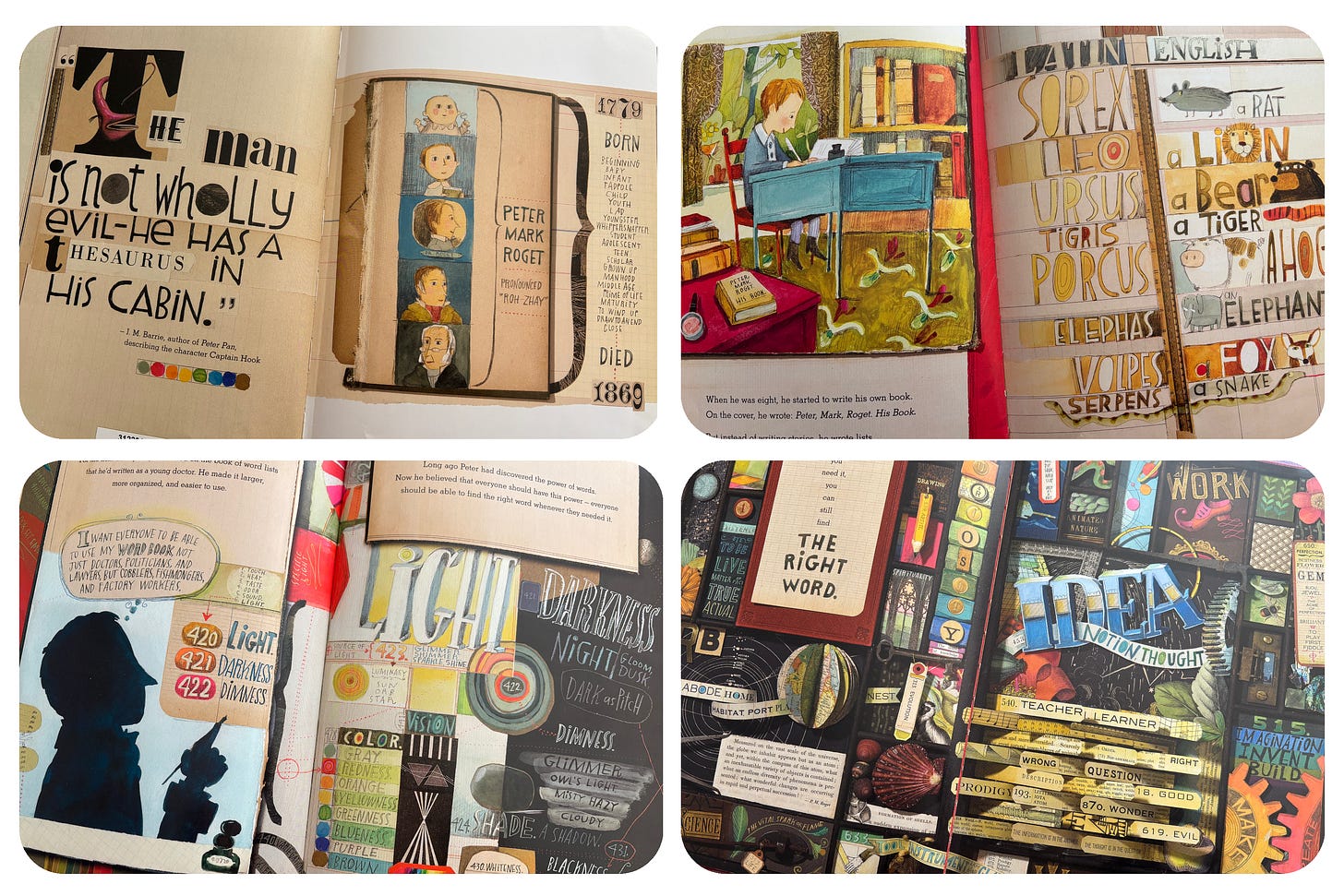
There is something just perfectly quaint about the story told and shown in The Right Word. Alternatives might be picturesque, charming, sweet, or attractive. None of those are quite right. It starts out with a wonderful (awesome, magnificent, superb, glorious, sublime, lovely, delightful, first-rate) quote about Captain Hook:
“The man is not wholly evil – he has a thesaurus in his cabin.“
J. M. Barrie, Peter Pan
The style of this book is amazing. It isn’t a stretch to say the style of this book is what makes this book for me, but the art is inextricably and beautifully woven with the story, partly because the story of Peter Roget is also a story about words and lists.1
The very first page has a timeline that shows us that Peter was born in 1779 and died in 1869. In between those dates, those years, those markers and milestones, there are a whole bunch of words that help elucidate the stages, a list of near-synonyms that convey the progression of a life, the flow from birth to death: beginning, baby, infant, tadpole, child, youth, lad, youngster, whippersnapper, student, adolescent, teen, scholar, grown up, manhood, middle age, prime of life, maturity, to wind up, draw to an end, close.
The illustration in this book is full of drawings and paintings and lettering and collage. There are wonderful illustrations that bring Peter and his history to life, but there are also beautifully illustrated pages of words and lists of words that are fantastically laid out and conceptualized and integrated and scattered throughout the book.
🌈 As I write this, I am keenly aware of an unarticulated love of synonyms, aware that the invisible threads of similar and adjacent words are central to how I talk about the world and life.
The book starts with an oblique mention of Peter’s father’s death. We learn that Peter and his family moved often and that he was a lonely boy, but he discovered that books make good friends. When he was eight, he started to write his own book.
“But instead of writing stories, he wrote lists.”
“Every year, Peter added new lists to his book. Some of his favorites were THE FOUR ELEMENTS, OF THE WEATHER, and IN THE GARDEN.”
“…Peter‘s word lists were not just scribbles. Words, Peter learned, were powerful things. And when he put them in long, neat rows, he felt as if the world itself clicked into order.“
You know how much I love that line, right?
Peter went on to be a doctor, but he continued to make word lists.
“In 1805, Peter finished his first big book of word lists. It had about one hundred pages, one thousand ideas, and listed more than fifteen thousand words! He kept it on his desk so that he could find just the right word whenever he needed it.”
In 1852, he published his Thesaurus.
A Life in Context
The Right Word tells such a delightful story of someone that probably most people have never read about. There is a two-page timeline in the back of the book that lists Roget’s life events in the context of historical events. It’s a really wonderful set of details, including the publication of Noah Webster’s dictionary, Mary Anning’s discovery of the remains of the ichthyosaur, the invention of the stethoscope, the discovery of Antarctica, Mary Shelley’s Frankenstein, and the patenting of the kaleidoscope by David Brewster.
There are so many wonderful, fun, and quirky things in this woven timeline. This is a beautiful way to look at a life in the context of history. Roget invented other things, too, including a slide rule and a pocket chess set.
This is really a delightful biographical children’s book. The illustrations are engaging and perfectly suited to the story. Even in the art, words play a central role in the aesthetic of the book. For a kid who loves words, this is a real treat.
At the very back of the book, there are two pages that contain the Author’s Note and the Illustrator‘s Note.
You should always read these pages. Sometimes these retrospective or explanatory notes offer the most wonderful lens through which to rethink what you have read or, in the case of an introduction or preface, to guide the reading.
In this case, the Author’s Note tells the story of Jen Bryant mistakenly packing a copy of Roget’s Thesaurus when leaving for a trip. She ended up intrigued and fascinated, and The Right Word came out of that.
Melissa Sweet’s note starts with this line:
“If there was just one word from Roget’s Thesaurus to describe making this book, it would be thunderclap, found under: 872. PRODIGY, phenomenon, wonder, marvel, miracle, spectacle, sign, important, thunderclap. The proverbial thunderclap sounded at the start of my research when I held Roget‘s original 1805 word book in my hands. On each page, Roget had drawn a vertical red line separating a numbered entry from its opposite. There were thousands of words carefully handwritten with nary a cross-out. It was an auspicious beginning.”
She goes on to talk more about the process of researching and illustrating the book. Her note ends with:
“734. PROSPERITY, good fortune, halcyon, lucky. Indeed, lucky is the right word.”
(Halcyon is a word I love.)
The Right Word was delightful. It cheered me up on a night where I felt tired and sluggish. It reminded me that there are people out there who really care about words. It excited me about a type of art I love. It reminded me that long, long ago, people could live fascinating and diverse and creative and analytical lives that now seem almost impossible and hard to fathom, lives that now seem quaint, charming, and endearing.2
Maybe this is simply the magic of a children’s book, the ability to bundle the details of a life as a wonder.
Old Words
I talked about books illustrated by Melissa Sweet several times. Jump in with these:
Episode 226: As a Child (River of Words)
Episode 227: Circles (A Splash of Red)
Episode 235 (Balloons Over Broadway)
Episode 66: Birdsong (The Boy Who Drew Birds)
Read More
Here are some other books written and/or illustrated by Melissa Sweet that you might want to look at if you have children in your life or, like me, you just sometimes like to flip through a children’s book.
Written and illustrated by Sweet:
Carmine: A Little More Red (will talk about this one soon as part of a post brewing)
Some Writer! The Story of E. B. White (grades 3-7) (I brought this home to read; it is much longer)
Illustrated by Sweet:
A River of Words: The Story of William Carlos Williams (author Jen Bryant)
A Splash of Red: Life and Art of Horace Pippin (author Jen Bryant)
The Boy Who Drew Birds: A Story of John James Audubon (author Jacqueline Davies)
Really old titles:
Charlotte in Paris and Charlotte in Giverny (author Joan MacPhail Knight) — I talked about Charlotte in Giverny Back in 2006 in Episode 24: A Distracted Fish Doodle. (The show is no longer publicly available, but I read through the notes and got swept away by a conversation about a little boy painting a picture.)
Out Loud
In looking back to pull up links for the times I talked about books by Melissa Sweet, I ended up listening to part of Episode 235, which is from 2017. In so many ways, it could be from today. Almost. Details are different. It’s a show with a timeline of a day, and the timeline is different. But still, it felt like I could have recorded that show last week.
I so often feel that way when I read back or listen back, and I hear echoes that overlay with very little variance on the current moment. There is the cascading sense of an accordion book, a stack of moments and impressions that, at times, appears tidy, appears flat, the present blocking the past, or askew, edges peeking out here and there, glimpses of different times, echoes that are similar as they reverberate through tunnels.
I miss it.
It’s a total non sequitur. I miss it doesn’t follow or make sense in line with this concertina moment. And yet it does. I miss it.
While I’ve always said that my writing here, at least initially, was like the podcast on a page, there is something different in the audible, in the voice, and in hearing words spoken, something appropriately intangible.
You can’t hold the words, and you can’t bookmark them, and you can’t pin them in place and draw lines between one sentence and another, connect dots or highlight the things that stand out. There are no page corners to turn down. It just is a rolling stream, white noise, background noise, a back track.
I talk out loud more now than ever before.
I don’t think that is simply age. I don’t think it is simply loneliness. I read out loud, too. Reading out loud or talking out loud is a way of slowing down. It invites listening to the words and to the rhythm of words.
You should try it sometime. I know that our impulse is to read faster and skim and jump from subhead to subhead or just look for the photos and read the captions, but what happens when you intentionally go back to the beginning of a letter (from any writer) and read a paragraph or two out loud? This isn’t about reading as fast as you can. We’re all guilty of that. We are all trying to do more and more and faster and faster.
This is about hearing the words.
Words often feel different when they are heard, when they are read aloud, when they are voiced with intentionality, with an awareness of cadence and flow and punctuation and the way thoughts connect to one another. Everything doesn’t have to be monotone or evenly paced. Not everything has to be slow or fast. The way words are strung together, in part, dictates how they should be read and how they should be heard and how they should be interpreted.
Read aloud, and the words pull you along.
Most of us don’t have time to slow down and read out loud. There is too much information out there. I don’t typically have time to listen to every voiceover that is available for posts, but I am actually reading a good bit of Proust out loud.
I do know that talking out loud, even in an empty room, even in the silence, even when no one will hear, has a way of freeing the narrative, unlocking the words, and slowing down the story. It’s sometimes the best shot at paying attention.
Illustrate Your Week Pages
Here are a few glimpses of pages from the last few weeks.
I post the prompts for Illustrate Your Week every Sunday here at Illustrated Life.
I am still doing my weekly diary list comics. I won’t continue sharing them full-size in weekly posts, but in another week or so, I will set up a page for the year. It’s a personal project I enjoy. It’s like twisting the kaleidoscope, looking at details in a different arrangement. (See last year’s project)
Weekly Bits and Pieces
Related posts: (expect broken links in old podcast notes)
Made It?
Thank you for reading along! I always enjoy your comments and invite you to chime in. Let me know what stands out for you, what you think after reading, or where we connect.
Remember when we used to do word lists in the comments section of these posts? Feels sort of full circle. Join in today with one of these:
A synonym (not already given in another comment) for wonderful.
What are you watching?
Thank you for reading Illustrated Life. Writers need readers, and I am grateful for every reader!
Paid options are available for those who want to support Illustrated Life, the podcast, and the weekly #illustrateyourweek prompt series. Subscriptions not your thing? One-time tip jar donations or wish list treats are always appreciated.
Unless otherwise noted, all images in this post are ©️ A. Cowen. All rights reserved.
Links to books are Amazon affiliate links. Always check your library.
Lists of various types recur in my writing, in my approach to tracking, in my systems for days and years, in my awareness of gratitude, and in my advocation of looking and seeing and opening one’s eyes. But maybe I am a little bit out of touch with my list making, something I hadn’t realized until I started looking at this book and thinking about all of the times I have talked about making a list of this or that or walking around and making a list of what you see or what you encounter or what you discover or what you think about. Recognizing this, I did exactly that this week. ✅
It isn’t lost on me that most (many) of the people who managed that were men, but I did really enjoy this story.





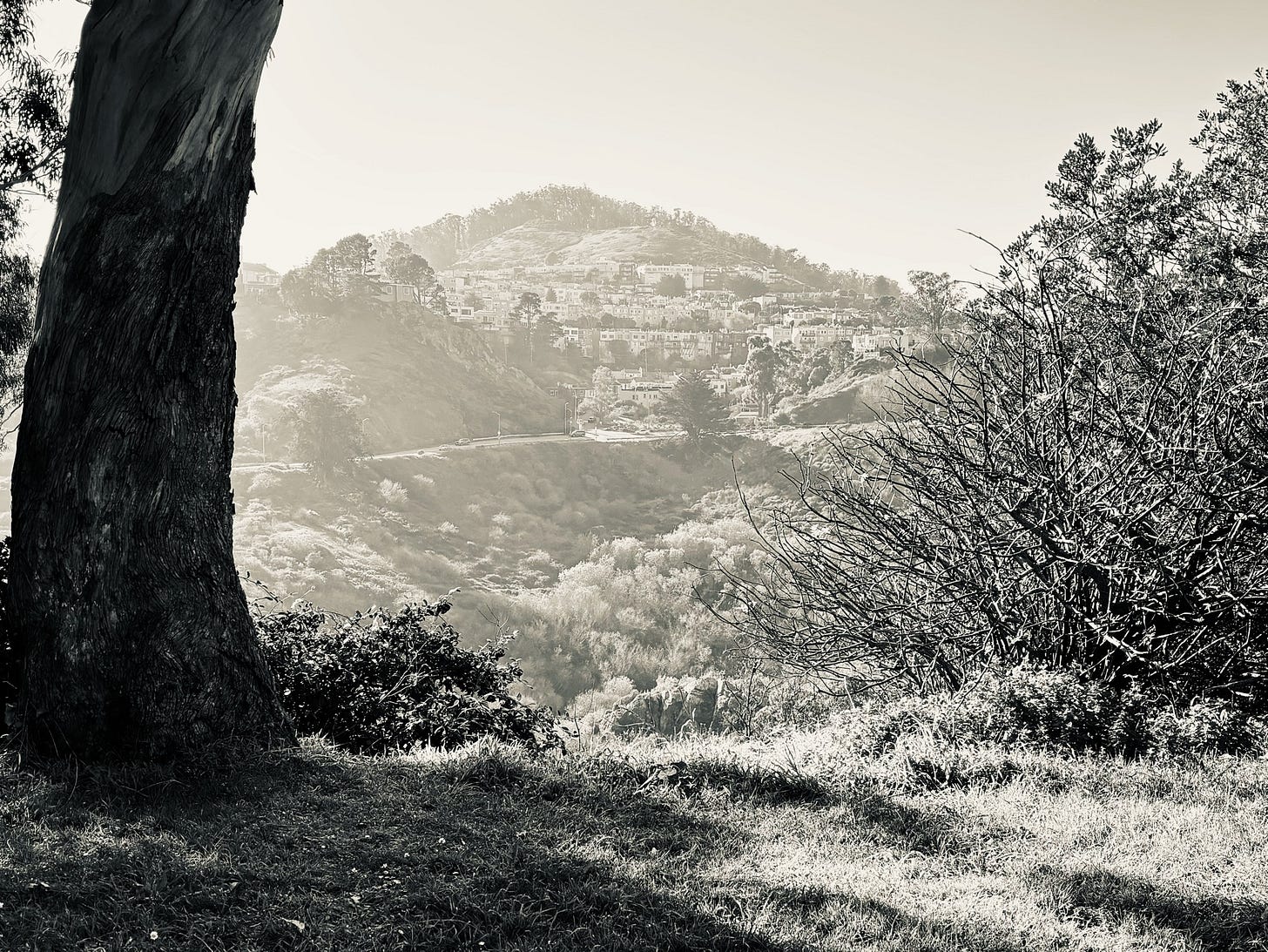
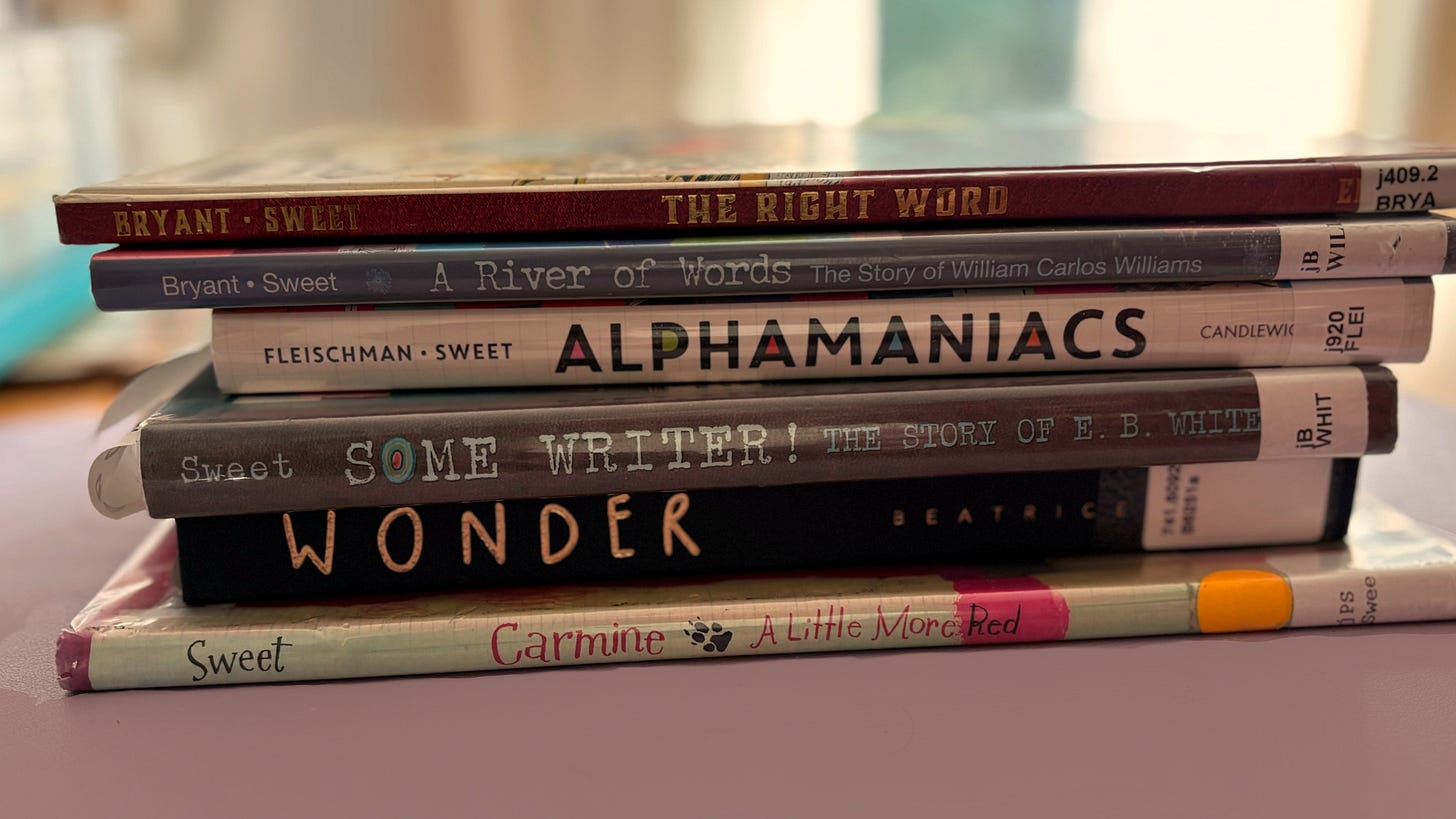
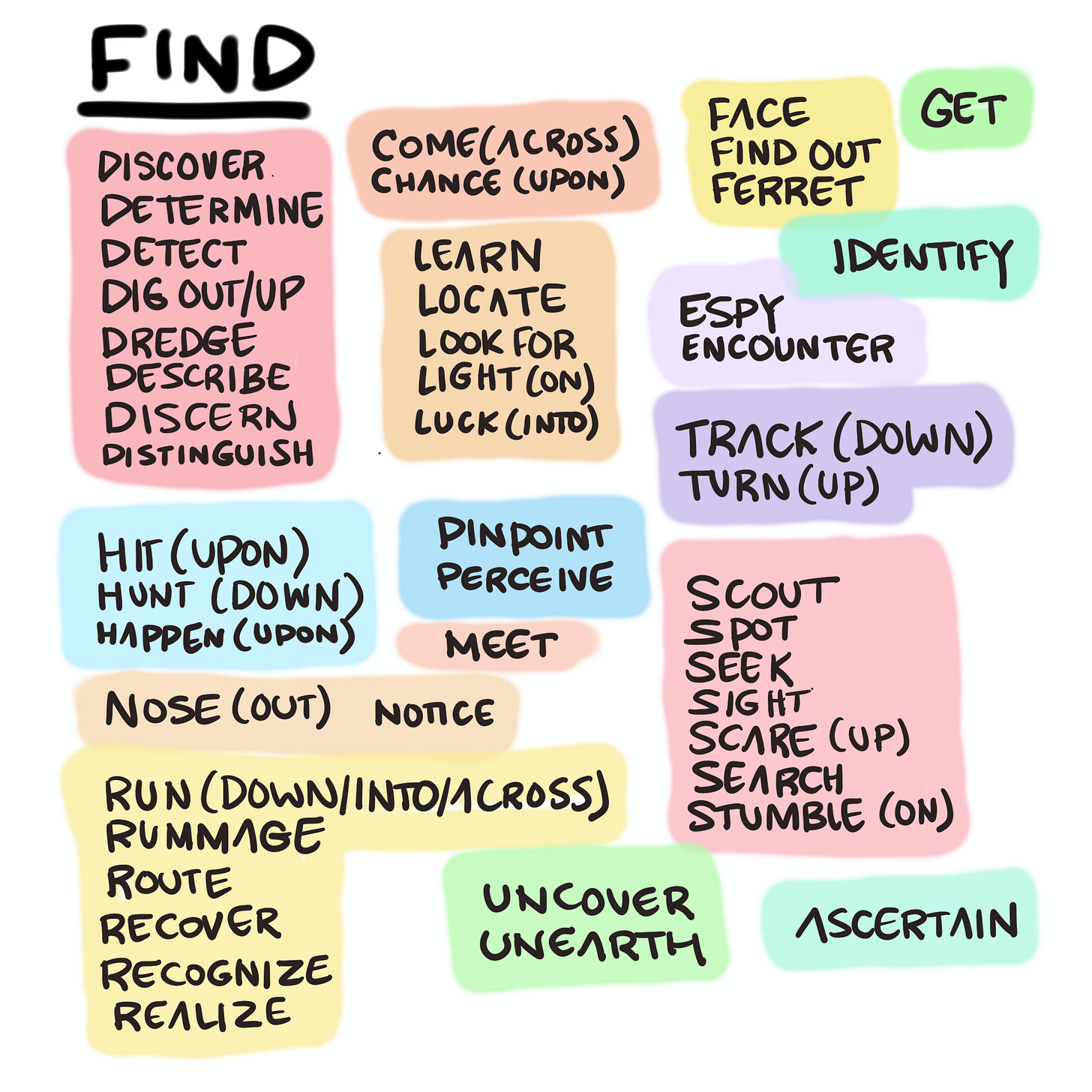
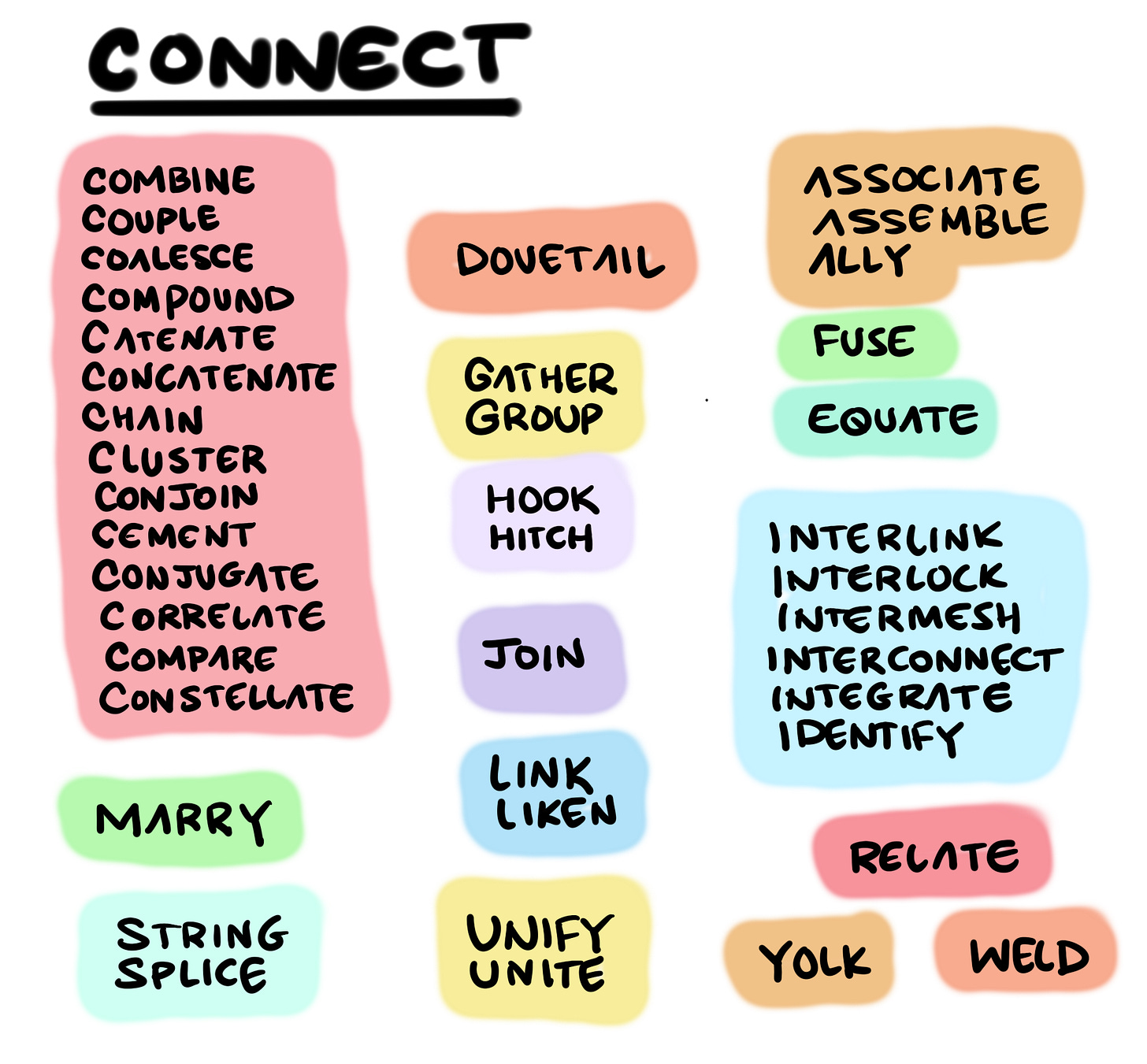
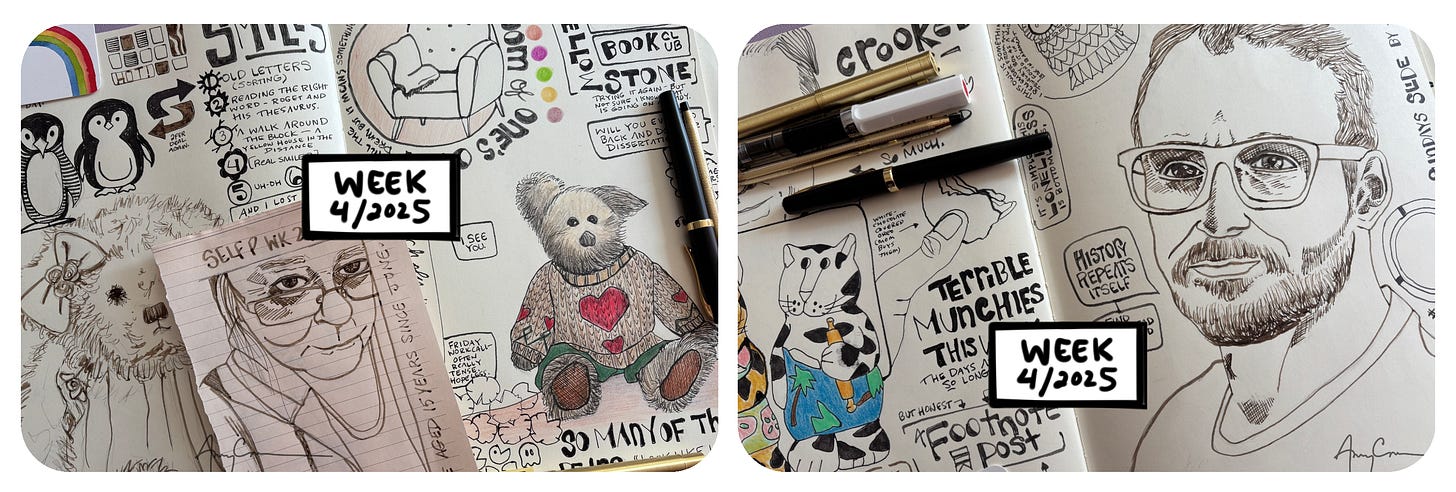

Another picture book I love about words is The Lost Words
You asked, "when was the last time you used a thesaurus?"
Two minutes before reading your post. Roget's 21st Century Thesaurus in Dictionary form, edited by Barbara Ann Kipper, head lexicographer of the Princeton Language Institute.
It's a wonderful thesaurus that also gives a concepts index at the back. I used it this morning to look up "immerse" and "immersed", a favourite way of being, because I want to freewrite and dig more deeply into the idea.
I love your meandering posts, Amy. Montaigne talked about wanting to "track the flutterings" of his mind. You are doing that and inspiring me to do the same. Now I'm off to order the children's book. Thank you.